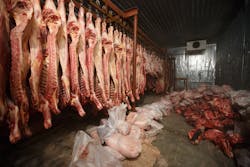As U.S. Meat Processors Remain Open, Safety Efforts Come into Question
On Tuesday, April 28, President Donald J. Trump invoked the Defense Production Act requiring meat and poultry producers across the United States to remain open during the COVID-19 outbreak.
The move comes as industry producers warn the nation's supply chain is breaking following operation disruptions. Companies including Tyson Foods, Smithfield Foods and JBS USA have temporarily shuttered processing plants for decontamination after hundreds of workers have contracted the novel coronavirus.
Trump denounced facility closures in the executive order, saying: "Such closures threaten the continued functioning of the national meat and poultry supply chain, undermining critical infrastructure during the national emergency. Given the high volume of meat and poultry processed by many facilities, any unnecessary closures can quickly have a large effect on the food supply chain. For example, closure of a single large beef processing facility can result in the loss of over 10 million individual servings of beef in a single day. Similarly, under established supply chains, closure of a single meat or poultry processing facility can severely disrupt the supply of protein to an entire grocery store chain."
While U.S. poultry and meat producers call for cooperation among all of the nation's stakeholders, the industry itself has faced years of scrutiny regarding its workplace safety practices.
A History of Injury
On Sunday, April 26, Tyson Foods' CEO John H. Tyson published a letter in The New York Times, The Washington Post and Arkansas Democrat-Gazette stating the company has had to close numerous plants in Indiana, Washington and Iowa for decontamination. He defended the company's safety efforts following reports that four workers have succumbed to COVID.
"As pork, beef and chicken plants are being forced to close, even for short periods of time, millions of pounds of meat will disappear from the supply chain," Tyson writes. "As a result, there will be limited supply of our products available in our grocery stores until we are able to reopen our facilities that are currently closed."
He continues, "Tyson Foods has a responsibility to feed our nation and the world. The government bodies at the national, state, country and city levels must unite in a comprehensive, thoughtful and productive way to allow our team members to work in safety without fear, panic or worry."
Arkansas-based Tyson Foods has faced numerous inspections and has been the subject of OSHA's Severe Violator Enforcement Program due to willful violations received following numerous worker injuries and fatalities.
A 2017 report published by the National Employment Law Project (NELP) examines OSHA severe injury data in the meat processing industry. The analysis found that the poultry industry as a whole has the 12th highest number of severe injuries of all industries reporting ranking above, auto, steel and other high-hazard industries.
Companies in 29 states covered by federal OSHA notified the agency of 17,533 incidents of the most severe work-related injuries during the period from January 2015 through September 2016. An average of 27 workers a day suffered work-related amputations or hospitalizations.
Tyson Foods ranked fourth and JBS/ Pilgrim’s Pride sixth in terms of severe injuries. More than 14,000 companies nationwide submitted data for the report.
The National Chicken Council responded to the findings, saying the NELP was "cherry-picking" data to advance the organization's efforts.
Meat and poultry producers continue to be under the magnifying glass, especially as workers raise additional concerns during the COVID-19 pandemic.
Smithfield Foods, the Chinese-owned meat conglomerate based out of Virginia, is facing a lawsuit alleging it continues to put its workers in danger. The Rural Community Workers Alliance and an anonymous Smithfield Foods Inc. employee filed the complaint citing unsafe work conditions and inadequate personal protective equipment (PPE).
In a response to the suit dated April 24, the company defended its workplace safety efforts, stating: “The inherent nature of meat processing, which is labor intensive, assembly line style production, makes social distancing particularly challenging."
Kenneth M. Sullivan, Smithfield president and CEO, previously addressed its measures in an April 12 statement, saying: “Unfortunately, COVID-19 cases are now ubiquitous across our country. The virus is afflicting communities everywhere. The agriculture and food sectors have not been immune. Numerous plants across the country have COVID-19 positive employees. We have continued to run our facilities for one reason: to sustain our nation’s food supply during this pandemic. We believe it is our obligation to help feed the country, now more than ever. We have a stark choice as a nation: we are either going to produce food or not, even in the face of COVID-19."
President Trump's executive order states that plant closures of larger facilities are "inconsistent" with the recent guidance issued by the Centers for Disease Control and Prevention (CDC) and OSHA and potentially could cause devastating disruption.
Enforcement Efforts
Published just before President Trump's invocation of the Defense Production Act for meat processors, OSHA and CDC's Joint Meat Processing Guidance identifies procedures that need to be taken to protect workers from COVID-19 exposure.
The CDC states that as long as a worker is asymptomatic and the employer takes additional precautions to protect them and the community, compliance will be met.
Meat and processing facilities should "(1) work directly with appropriate state and local public health officials and occupational safety and health professionals; (2) incorporate relevant aspects of CDC guidance, including but not limited to this document and the CDC’s Critical Infrastructure Guidance; and (3) incorporate guidance from other authoritative sources or regulatory bodies as needed."
The Joint Meat Processing Guidance specifically addresses cleaning of shared meatpacking and processing tools; screening employees for the coronavirus before they enter work facilities; managing workers who are showing symptoms of the coronavirus; implementing appropriate engineering, administrative, and work practice controls; using appropriate personal protective equipment; and practicing social distancing at the workplace.
Solicitor of Labor Kate O’Scannlain and Principal Deputy Assistant Secretary for OSHA Loren Sweatt released an additional statement on April 28 to clarify the measures following the executive order requiring plants to remain open.
"As stated in the Joint Meat Processing Guidance, employers should conduct worksite assessments to identify COVID-19 risks and prevention strategies and then implement them," they advise. "It is important that employers seek to adhere to this Guidance. To the extent employers determine that certain measures are not feasible in the context of specific plants and circumstances, they are encouraged to document why that is the case."
Should the agency deem an inspection necessary, O'Scannlain and Sweatt write: "In the event of an investigation, OSHA will take into account good faith attempts to follow the Joint Meat Processing Guidance. OSHA does not anticipate citing employers that adhere to the Joint Meat Processing Guidance. Additionally, because of the President’s invocation of the DPA, no part of the Joint Meat Processing Guidance should be construed to indicate that state and local authorities may direct a meat and poultry processing facility to close, to remain closed, or to operate in accordance with procedures other than those provided for in this Guidance."
The pair add that litigation surrounding unsafe work practices often uses an employer's adherence to OSHA standards and guidance in an employer's favor. In that case, the Department of Labor will consider defending meat, pork or poultry employers who operate in compliance with the Joint Meat Processing Guidance.
“Where a meat, pork, or poultry processing employer operating pursuant to the President’s invocation of the DPA has demonstrated good faith attempts to comply with the Joint Meat Processing Guidance and is sued for alleged workplace exposures, the Department of Labor will consider a request to participate in that litigation in support of the employer’s compliance program," they said. "Likewise, the Department of Labor will consider similar requests by workers if their employer has not taken steps in good faith to follow the Joint Meat Processing Guidance."
About the Author

Stefanie Valentic
Stefanie Valentic was formerly managing editor of EHS Today, and is currently editorial director of Waste360.
